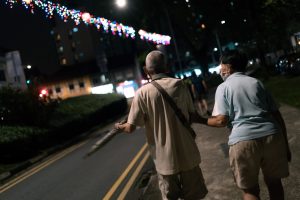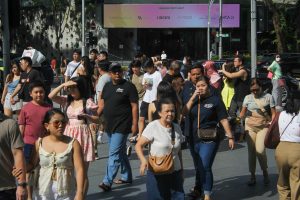Top image credit: Rice file photo/Zachary Tang
I don’t know how to ask Mr Au Siew Chong, 86, why he has never married, but I try anyway.
“My job is very … what lah. No one look at me. My salary little bit. Not high,” he says.
As a young man, Mr Au worked as a lift attendant in the old Supreme Court (now the National Gallery), where he would often see Lee Kuan Yew and other pioneering statesmen passing through. The youngest of eight siblings, and the only one still alive, he now lives alone in a rental flat in Ang Mo Kio.
He lived with his mother until she passed away, after which one of his brothers asked him to move out. He then moved in with one of his sisters, until family tensions brought an end to that arrangement too.
Although he’s jovial and good-humoured, he doesn’t elaborate, and I can’t tell if he doesn’t want to or just doesn’t have the words.
Around 20 years ago, he moved into his current place. The bottom few floors of his block are occupied by AWWA, a social service agency (SSA) that works with vulnerable groups around the island, including elderly folk. The ground level has a Seniors’ Activity Centre, and they also run a befriending and support scheme called the Personal Care Service, which he has been under since 2014.
Today, his days look mostly the same. They start at 4:00, sometimes 5:00 AM.
“Go coffeeshop, sit there, have a kopi. Sometimes have breakfast, sometimes no. Maybe go to Chinatown, take the bus,” he says.
Mostly, he goes by himself. He sees his nieces and nephews during Chinese New Year, and chats here and there with the other elderly folk at AWWA. Some nights he thinks about his mother and his past, and it’s then that the loneliness creeps in.
“Sometimes at night, dream bad things. But don’t think too much lah. Just enjoy,” he laughs nervously.
“Go to heaven early, better.”
I don’t know what to say, so I laugh nervously back.
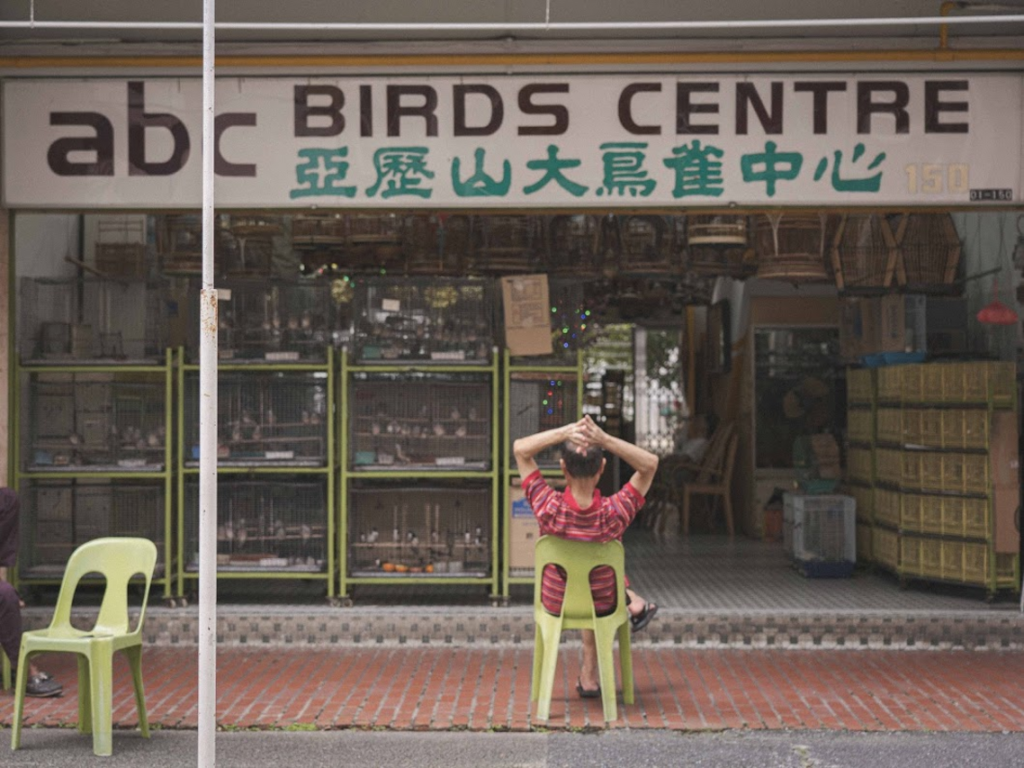
According to a breakdown released by Samaritans of Singapore (SOS), elderly suicides reached an all-time high in 2017. The data showed that while the absolute number of suicides had fallen across all age groups, the one exception was the elderly, for whom numbers were the highest since tracking began in 1991.
There is no single template for the ‘elderly orphan’: the only universal characteristic is that they live alone. Some might have never married, others might be the surviving half of a childless couple, and still others might be estranged from their children or simply see them too infrequently for this to make a difference.
Many struggle with poverty and insufficient retirement adequacy, especially those living in rental flats in ageing neighbourhoods like Whampoa and Bukit Merah. Some are in poor physical health, which, in turn, adversely affects their mental well-being. On top of the general mental decline that accompanies ageing, the pain of managing conditions like arthritis can add to their distress.
However, many still prefer living alone, whether out of stubbornness, pride, or the reluctance to ‘be a burden’. In cases like these, isolation slowly builds for decades, until it is so entrenched that any other way of life seems inconceivable.
Couple this with poor digital connectivity and language barriers, and you have a perfect storm of risk factors for elderly depression.
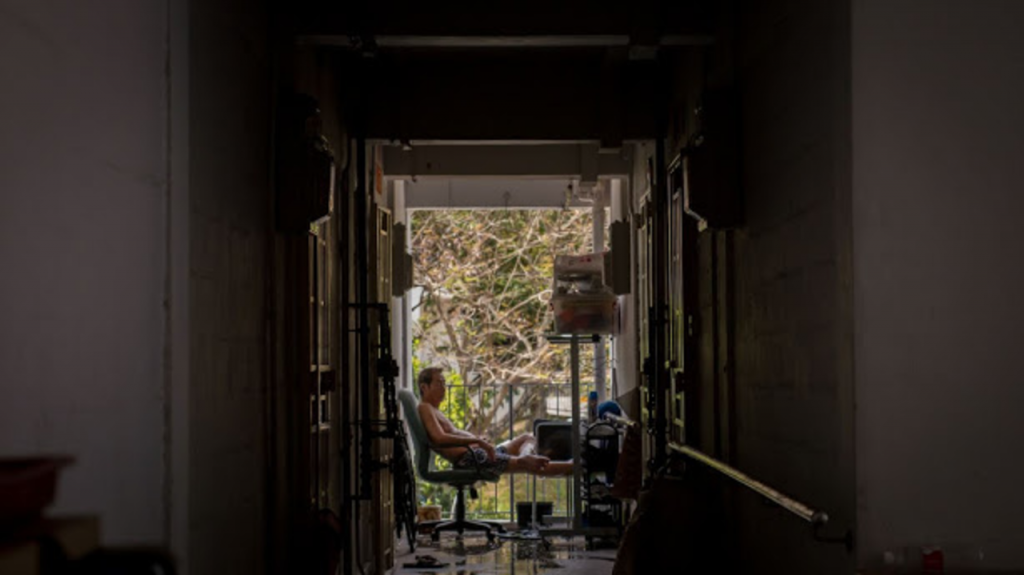
For Meng Wai, a longtime volunteer with Lions Befrienders (another SSA which supports elderly folk through home visits), talking about death head-on is par for the course.
He explains that while he’s never encountered a clear suicide risk, many elderly beneficiaries he’s met casually bring up death in conversation, saying they “wouldn’t mind to go soon” or “I’m already old, just let me die”.
“I guess we have to do a kind of risk assessment. Is there a real cause for concern, or is it a spur of the moment thing?” he tells me.
“I might ask if they have made plans or taken certain steps, and if so we’ll raise the alarm. Often it’s not anything concrete, I haven’t met an elderly person who genuinely wants to commit suicide yet. But the loneliness is there, and we try to help with that.”
Meng Wai also helps with after-life arrangements for his beneficiaries, including finding out their last wishes and arranging their funerals. But when I ask him how he even starts such a conversation, he surprises me by saying he doesn’t need to. They often bring up the topic themselves.
“I guess they’re already open to discussing life and death because they know they’re at that point of their lives,” he speculates. “And I want to do it too, simply because I don’t want them to have any regrets.”
Peck Wei, another volunteer with Lions Befrienders, echoes this.
“When they see funerals at the void deck, they’ll point it out to me. Sometimes they know the person who died. But mostly, I think they’re afraid of dying alone and not being found.”
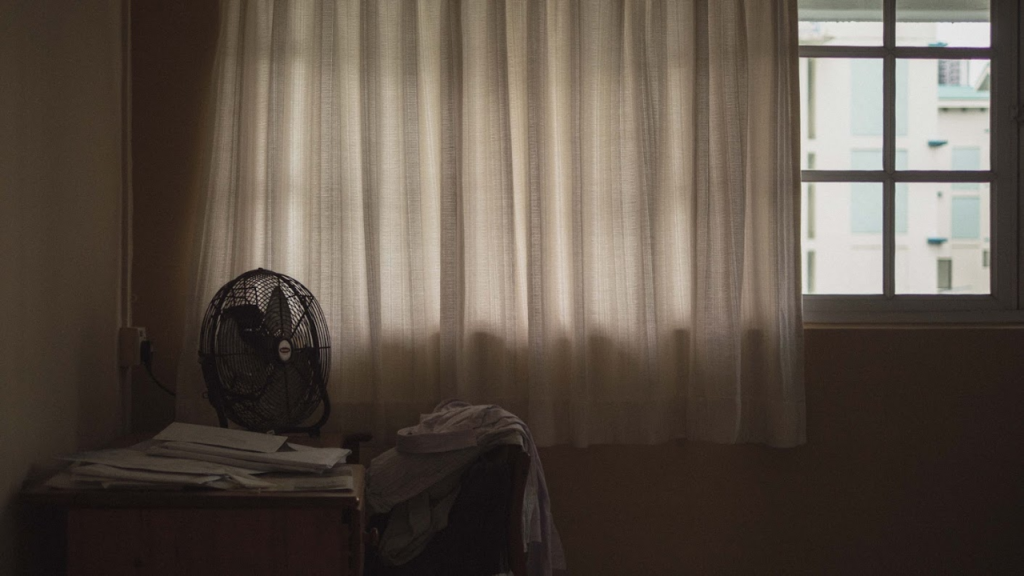
This said, befriending is not for bleeding hearts with hero complexes. The real meat-and-bones work takes time, effort, and patience, requiring several months’ commitment at the minimum. Anything less is too disruptive.
According to Peck Wei and Meng Wai, befrienders usually provide two kinds of assistance. The first is with practical tasks: changing bedsheets, fixing doctors’ appointments, paying bills, buying groceries, and doing repairs.
The other, as the name suggests, is the actual befriending.
Building rapport takes time in any relationship, but is especially challenging in a befrienders’ context. To new volunteers, many elderly folk can seem reticent, resistant, or plain resentful at having their independence ‘encroached’ on.
For instance, Peck Wei tells me about Letchime, an elderly woman she has been visiting for the last five or six years.
As a teenager, Letchime had one of her legs amputated below the knee. Despite this, she remained active well into her old age, continuing to make trips to Tekka Market on her own. from her home in Whampoa This made it hard for her to accept that she needed help, even as her health began to decline.
“The first time we met, she said I don’t want, I don’t need a befriender,” Peck Wei tells me.
On top of this, beneficiaries can seem totally uninterested in efforts to get to know them.
“A lot of the time, whatever you propose, they will say no. They generally don’t want to engage in a lot of activities. I think it’s just that at their age, they don’t like going out of their comfort zone,” adds Peck Wei.
According to her, it takes persistence and trial-and-error to find something that works. In Letchime’s case, it was little things like buying treats, and trying out simple activities like scratch books or colouring books, which won her over. Meng Wai, meanwhile, prefers a lighthearted approach.
“I often find that elderly folk just want simple things, a bit like kids. Ice cream, Coke … you don’t have to be so serious all the time or treat them like ‘elders’, just treat them like friends. I find they respond better when I crack jokes.” (With a twinge of regret, I realise this is probably what I should’ve tried with Mr. Au.)
However, he acknowledges that there’s a line to walk between getting a beneficiary to open up, but not condescending to them or making them feel completely helpless.
“I don’t want them to feel like they ‘need’ us, that they’re dependent on our help,” he says. A lot of the time, they are in fact quite self-sufficient (and proud of this), just like Letchime and Mr Au.
“I always tell newer volunteers that we’re not here to ‘save’ them. You need to try and stand on the same platform as them, and remember that you have things to learn from them too.”
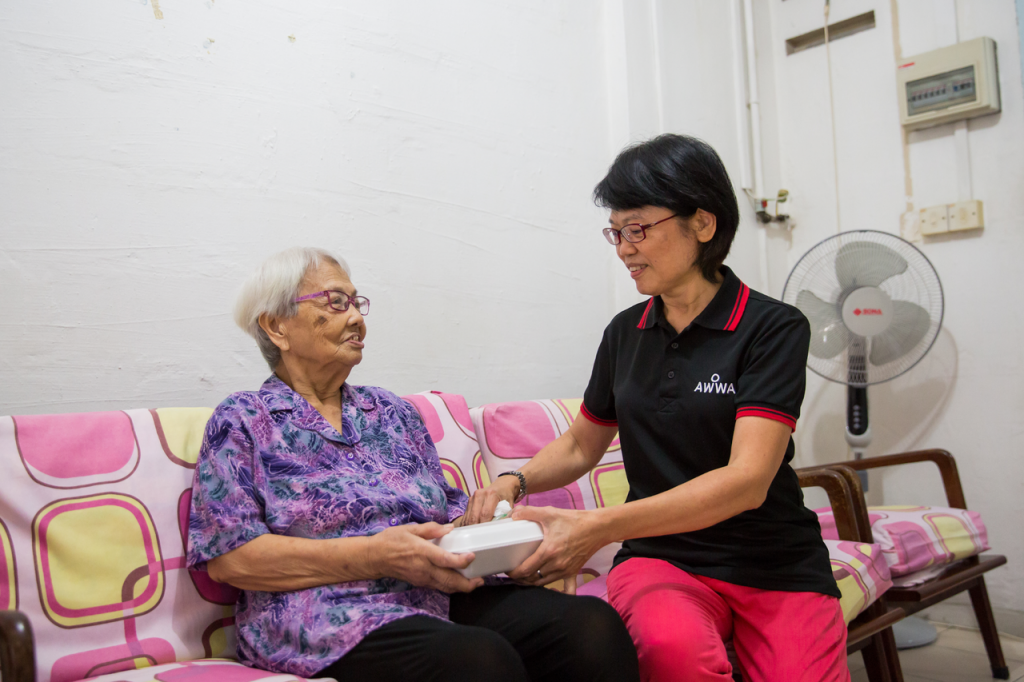
And then there are other types of elderly loneliness.
A couple of weeks after I meet Mr. Au, I find myself seated across Nellie Teo at the Wicare Support Group’s office in Bishan Junction 8. Nellie, 70, was widowed in January this year when her husband passed away from cancer.
“We were living in JB for many years, and my husband and I are childless. So it’s just him and me. My life with him … it was always just the two of us. When he passed away, I was lost,” she tells me.
I have never cried in an interview before, but as Nellie describes her anguish in the wake of her husband’s passing, I can’t stop myself from tearing up.
“I was numb after he died. I could barely call the undertaker to come get the body. And I have no religion. I don’t know how to pray. So all I did was kiss him and I said, ‘bring me with you.’”
“The next day I went to the casket. The casket people asked, ‘why are you alone?’. I took his ashes and put them in my bag, and went to scatter them at the beach in Desaru …” her voice trails off.
In desperation, Nellie began Googling places to turn to. The Internet pointed her to Wicare, and she travelled down to Singapore to meet the centre’s manager within days. Shortly after, she began attending support group sessions.
The specialist support that Wicare provides, according to Nellie, is utterly critical. It wasn’t enough to be around other people her age; she had thought of calling a helpline, but eventually dismissed the idea.
Rather, she needed to be around other women who were going through the agony of bereavement, and could relate to each others’ pain. Even widows with children, she explains, are at risk of becoming withdrawn and isolated, because they don’t know how or don’t feel able to open up to their kids.
Over the last year, the women in her counselling group have become each other’s closest companions and confidantes—an antidote to loneliness they could not have found anywhere else.
“We call one another when we need someone to talk to. Especially at night, when we can’t sleep,” she tells me.
She candidly admits that without each other, and without Wicare, some of them would have contemplated suicide.
“You can’t just go and talk to anybody. I felt so choked up before I came here. Like I had been keeping everything inside … How are you supposed to go on? Before, I had him. All the little things, like changing a lightbulb, I could just say Dear, can you take care of this. But now it’s just me. Everything has changed.”
“Until I found this place. It makes you feel like you’re not the only one.”
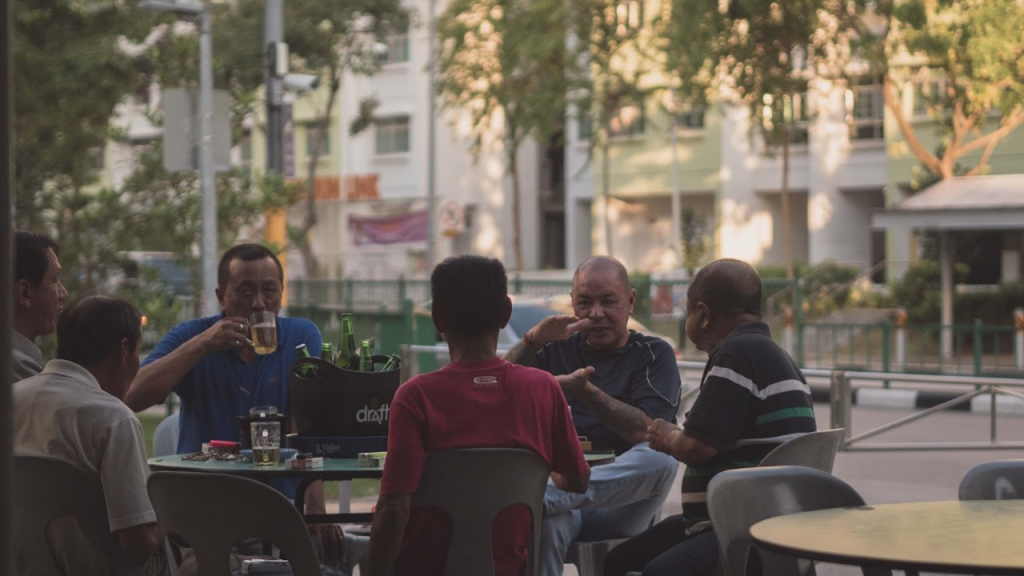
Throughout our conversation, Nellie’s appreciation for Wicare is obvious and effusive. She mentions, repeatedly, that she doesn’t know where she’d be without their help. I believe her; I can’t imagine she would be able to tell me, a complete stranger, about her loss without their support.
But one day, the penny dropped: she realised Wicare needed support, too.
“My friends and I come in here all the time, use the rooms, have coffee, go for their outings. Then one day we were asking ourselves, ‘where got such thing, an organisation where you just come in and eat and drink and no need to pay money?’ So we were wondering … ‘How come? Where does Wicare get the money to look after us like this?’
The answer, of course, is that it takes a village.
WiCare, Lions Befrienders, AWWA, and dozens of other organisations supporting elderly Singaporeans all receive funding from a range of sources. Part of this comes from Community Chest (the fund-raising and engagement arm of the National Council for Social Services), and part from private donations.
On top of this, they are reliant on armies of volunteers who labour behind the scenes week after week, offering their kindness and dedication even when no one is watching. Collectively, they strive to end elderly loneliness by creating its opposite: connectedness.
By the end of my interviews, it’s dawned on me that Mr. Au, Letchime, and Nellie are all, relatively speaking, lucky. Although the SSAs run robust outreach programmes, they can’t reach every elderly Singaporean in need of their services. For every beneficiary whose days they brighten with a packed meal or a kind word, there is another senior alone in a flat simultaneously too small and too big.
But if they’ve shown me anything else, it’s that we shouldn’t underestimate the power of ordinary kindness and generosity—of which there is often more than we imagine, hard as it is to see from behind shuttered windows and closed doors. The trick is that we all need to go knocking.
This story was sponsored by Community Chest.
In FY2018, Community Chest disbursed $3.4 million to support 20 programmes that care for vulnerable seniors. These programmes include befriending and counselling services and senior home care run by social service agencies like AWWA, Lions Befrienders and WiCare. To find out more about the impact of your donation, visit www.comchest.sg/addanewstory.
Contact the AWWA Senior Community Home at 6511 6686.
Contact Lions Befrienders at 1800 375 8600.
Contact Wicare Support Group at 6354 2475.
And if you have thoughts on this story, contact us at community@ricemedia.co.


